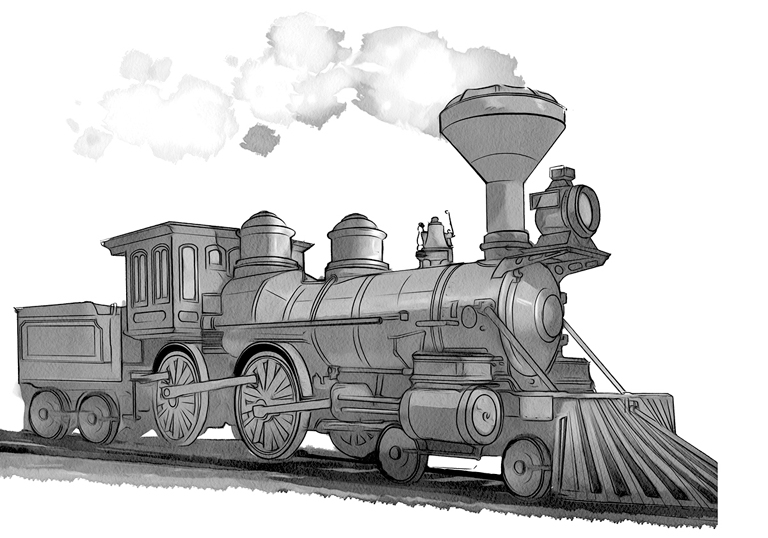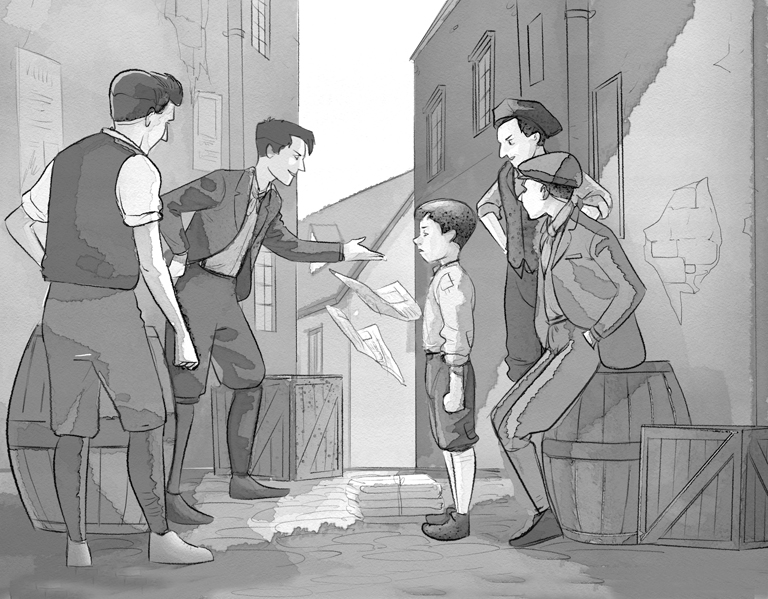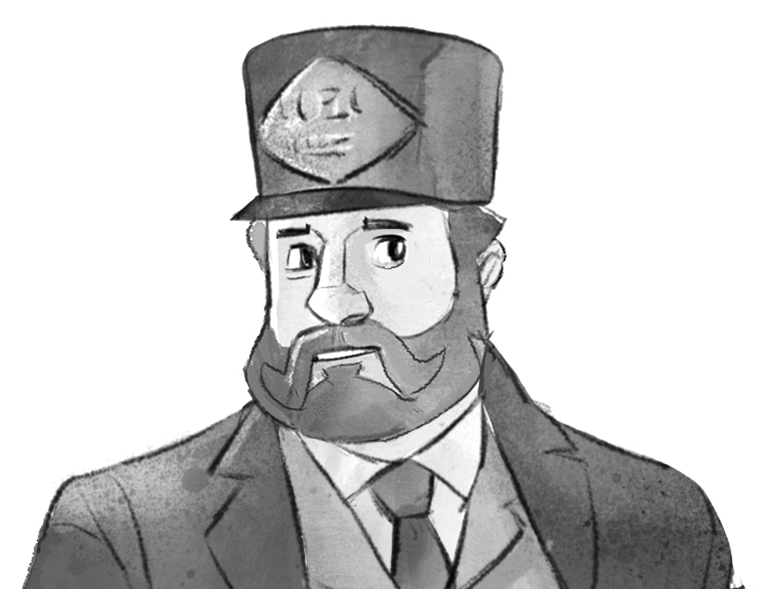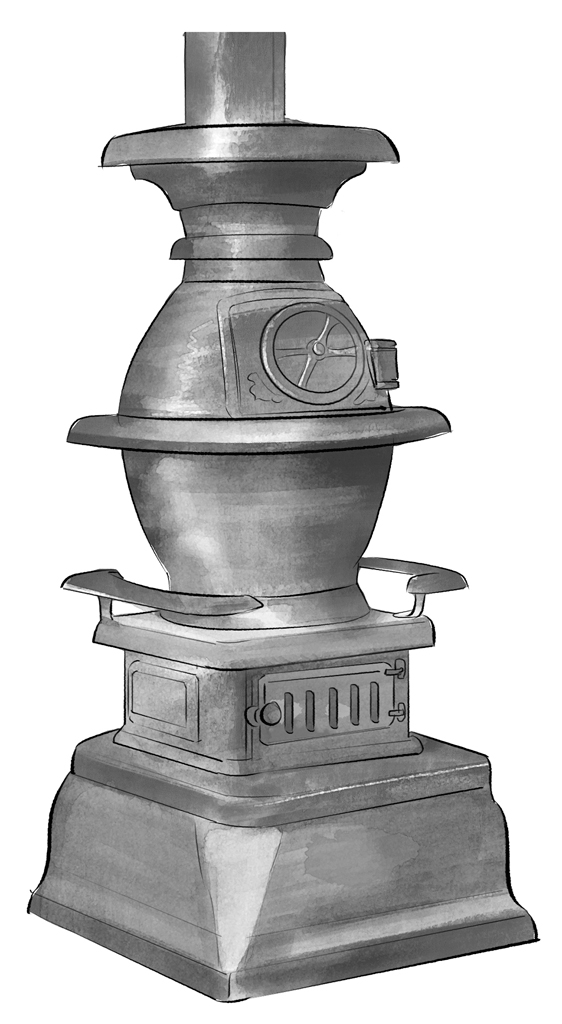The Newsboy

The Imagination Station stilled. Beth looked out the windshield. She could see a busy city street.
The buildings were tall and made of brick. There were lampposts in front of the buildings. The people wore old-fashioned clothes and hats. Horses pulled wagons, carts, or buggies.
Beth turned toward Patrick to say something. But his seat was empty!
Beth pulled on the door handle. It wouldn’t budge.
“Let me out!” she shouted at the machine. She pounded on the glass. She leaned her shoulder against the door and pushed.
Nothing happened. Beth was trapped inside.
This must be lockdown mode, she thought. But where’s the danger?
The Imagination Station began to roll forward as if in response. It moved along the street.
Beth thought the machine was following a young boy. His clothes were barely more than rags. His face and hands were black with dirt. He had a stack of newspapers underneath his arm.
The boy was shouting, “Get the Tribune! Two cents!”
The newsboy caught up with some men in brown suits. One of the men bought a paper. He handed money to the newsboy. The boy dropped the pennies into the pocket of his knickers.
Just then, Beth heard a voice. It was coming from three speakers in the machine’s ceiling.
The Imagination Station’s speakers blared. “In the 1870s, New York City was filled with crime. The jails held more than eight hundred children ages nine and up. Thirty thousand more children lived on the streets.”
Beth heard a strange noise. It was like a birdcall or a whistle. Why-o! Why-o! She couldn’t tell what had made the sound.
The voice in the Imagination Station said, “One street gang of youths was known as the Whyos. They were named after their bird-like gang signal. For twenty-five dollars, a member would shoot someone in the leg.”
That’s awful, Beth thought.
She focused on the newsboy. He hollered, “Jesse James robs stagecoach! Read all about it!”
Beth saw an older boy in a green cap. He seemed to be watching the newsboy. The older boy cupped his hands over his mouth. He blew into his hands and made a noise . . . Why-o.
He must be in the Whyos gang, Beth thought.
The boy in the green cap ran over to the newsboy. He grabbed the smaller boy by the arm. He dragged him into an alley. Copies of the Tribune scattered everywhere.
The Imagination Station rolled into the alley. Beth could see that there was no back entrance. The newsboy was trapped.
“You’re selling newspapers on the Whyos’s street,” the bigger boy said. “Hand over your money or else!”
Beth wanted to help the newsboy. She shouted, “Police! Police!” But no one could hear her.
She punched the car’s horn. It didn’t work. All she could do was watch the robbery.
The newsboy said, “The money is in my boot.” He bent down. Suddenly he threw some sand in the gang member’s face.
The older boy took a step back. He rubbed his eyes.
The newsboy tried to get out of the alley. But the other boy blocked him.
“I won’t let you rob me,” the newsboy said.
Beth could see his two front teeth were missing.
“We’ll see about that,” the older boy said. Then he used his hands to whistle Why-o, why-o.
Three more youths came running into the alley. They surrounded the newsboy.

The Imagination Station’s windshield started to spin with colors. Beth couldn’t see what was going on.
“Go back to New York,” she shouted at the machine. “I need to know what happens!”

Patrick gave Mr. Alford a weak smile. Then he looked at the boards of the platform. “My parents aren’t here,” Patrick said truthfully.

The conductor took off his cap. He knelt next to Patrick. “Tell me, have you seen your parents recently?” Mr. Alford asked kindly.
Patrick didn’t know how to answer. Time was different in the Imagination Station. Finally he asked, “What day is it exactly?”
The conductor chuckled. “Today is Saturday, January 31, 1874, in the year of our Lord,” he said.
“Wow, 1874,” Patrick said. He scratched his head. “It’s been centuries since I’ve seen my parents.”
A look of pity crossed Mr. Alford’s face. “You’ve been alone a long time,” he said. The conductor stood up and patted Patrick’s head. “I think I know someone who can help.”
Mr. Alford put a hand on Patrick’s arm. Then he guided Patrick toward the passenger car.
Patrick sighed with relief. All he wanted was to read the letter and find Eugene. No one was here, so that meant getting on this train.
Patrick followed Mr. Alford to the passenger car. The door in the center of the car was open. Patrick stepped up the three stairs and onto the railcar. He stood just inside.
A little heating stove was near the door. Pretty lamps hung from the ceiling. The seats were covered in gold-and-red fabric.
A few adults sat in pairs up front. Five children were clustered at the back of the car. There were two girls and three boys.

Suddenly something firm and moist hit Patrick’s forehead. Then it bounced off.
Patrick rubbed his forehead. He looked at the ground. A small, bruised apple lay on the red carpet.
Mr. Alford hadn’t noticed the flying fruit. He had moved toward the back of the car. He was talking to a woman passenger.
Patrick picked up the small apple. He scanned the passengers’ faces. No one seemed to be looking at him.

Then Patrick’s eyes locked with a boy’s. It was the same kid who had stuck out his tongue. The boy grinned at him.
